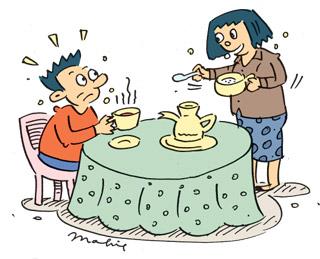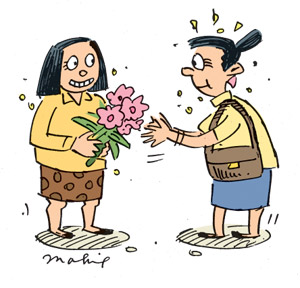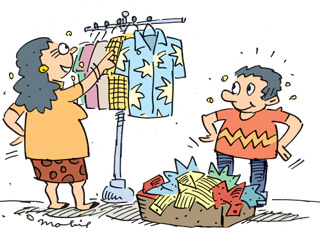|

by R. S. Karunaratne
Grammar patterns of ‘take’
‘Take’ is an irregular verb (take, took, taken) that means to move
something to another place, to perform an action or to accept.
1. ‘Take’ is used to talk about moving somebody or something from one
place to another.
The abducted child had been taken to Kekirawa.
|

I don’t take sugar with tea. |
Mother asked me to take the files to office.
Go with uncle Harry. He will take you to school.
Are you going to take all these books to the class?
You cannot take it without my permission.
2. ‘Take’ is used to talk about taking something to someone.
Take these flowers to Mary who is in hospital.
Can you take this file to the director?
Take some sweets if you want to see the children.
3. ‘Take’ is used to talk about the duration of journeys or actions.
How long does it take from Panadura to Colombo?
It will take you about one hour by train.
It takes me two minutes to type this letter.
The degree course will take four years.
4. ‘Take’ is used with many nouns to form compound verb phrases.
I had to take the bus as the train services were paralysed.
She usually takes the train to reach office.
If you are in a hurry, take a taxi.
If you are in London, you can take the metro.
Do you take milk with tea?
I don’t take sugar with tea.
Some young men take drugs.
|

Take these flowers to Mary who is
in hospital. |
You have to take an exam after the course.
The new principal has taken control of the school administration.
XYZ party will take a lead in the forthcoming election.
Parents have to take responsibility for the safety of their children.
The new minister will take office at the auspicious time.
The coronation will take place at the royal palace.
Grade Five students will take part in a mock examination.
We usually take pity on beggars.
Don’t take offence for my remarks.
If you have a problem, take advice from someone.
5. ‘Take’ is used in many phrasal verbs.
Nalin takes after his father. (resembles)
You are not supposed to take my books away. (remove)
I want to take back this damaged book to the bookshop. (return)
Are you willing to take back what you’ve just said? (admit that you
were wrong)
We do not take off our clothes in public. (undress)
The plane took off at 1.30 p.m. (left the ground)
I’m going to take on a new job. (agree to do it)
The guard took over my camera. (became responsible for it)
Not all journalists are good writers.
Take him for example ....
I take your point, but don’t you think that the capital punishment is
too harsh? (I see what you mean)
There is life after death. Take it from me. (what I say is true)
Know your idioms
Idioms are a colourful and fascinating aspect of English. They are
commonly used in all types of language, informal and formal, spoken and
written. Here are ten idioms commonly used in English. Tick off (a), (b)
or (c) which you think is the closest meaning to the given idiom. Check
your answers with the key.
1. You should never agree to his terms in the first place.
(a) in the beginning
(b) at last
(c) in the middle
2. This year’s election results were a foregone conclusion.
(a) not known
(b) obvious
(c) doubtful
3. The company has recruited an old hand for editing the news
bulletin.
(a) inexperienced person
(b) very old person
(c) experienced person
4. Samadara has an interesting face, but she is no oil painting.
(a) not attractive
(b) very attractive
(c) simple
5. The politician made some off-the-cuff remarks which were damaging
to his party.
(a) good
(b) carefully planned
(c) not planned
6. The manager is at odds with the director about certain items of
expenditure,
(a) agrees
(b) disagrees
(c) unaware
7. I felt like the odd man out because others were watching
television except me.
(a) someone different
(b) comedian
(c) foreigner
8. My aunt is as nutty as a fruitcake.
(a) kind
(b) pleasant
(c) crazy
9. At Law College I never learned the nuts and bolts of actually
practising law.
(a) mechanism
(b) practical details
(c) theory
10. My sister cannot cook for nuts!
(a) cannot cook nuts
(b) cannot cook for parties
(c) cannot cook at all
*****
Key
1. (a), 2. (b), 3. (c), 4. (a), 5.
(c), 6. (b), 7. (a), 8. (c), 9. (b), 10. (c).
*****
Starters
Demonstrative
adjectives and pronouns
'This, these, that, those' are demonstrative adjectives.
This building is old.
|

Those shirts are clean. |
These buildings are old.
That shirt is clean.
Those shirts are clean.
'This, these, that, those' can also be used as demonstrative
pronouns.
This is an old building.
These are old buildings
That is a clean shirt.
Those are clean shirts.
'This' and 'That' are used with singular nouns. 'These' and 'those'
are used with plural nouns.
'This' and 'These' are used to point to people or things that are
near us.
'That' and 'Those' are used to point to people or things that are far
from us.
When a collective noun is used along with 'a pair of' or similar
expression use a singular verb.
This flock of sheep is beautiful.
That pair of trousers is black.
This band of musicians is playing rap music.
That flock of birds is about to fly away.
This bunch of bananas is green.
Note: A collective noun is the name of a group of people or things.
Activity
Underline the correct demonstrative adjective or the demonstrative
pronoun in the following sentences.
1. These/Those pens on the chair over there are quite new.
2. Is this/that your book you lost yesterday?
3. No, mine is this/that blue one here.
4. Please pass me that/this black file inside your drawer.
5. I have to put these/those papers in it.
*****
Key
1. those
2. this
3. this
4. that
5. these
*****
Memory bonds
One word is missing in the following pairs of words. Write the
missing words and check your answers with the key.
1. Rice and...
2. East and....
3. Curd and....
4. Pots and....
5. Fork and....
6. Cup and....
7. Soap and....
8. In and....
9. Door and....
10.Here and....
11.Up and....
12.Bat and....
13.Hot and....
14.High and....
15.Pepper and....
16.North and....
17.Bread and....
18.Night and....
19.This and....
20.Black and....
******
Key
1. curry 2. west 3. honey 4. pans 5. spoon 6. saucer 7. water 8.
out 9. window 10. there 11. down 12. ball 13. cold 14. low 15. salt 16.
south 17. butter 18. day 19. that 20. white.
****** |

